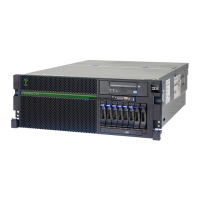5486LPOpS.fm Draft Document for Review October 18, 2004
562 IBM Eserver i5 and iSeries System Handbook
The Universal Coded Character Set (UCS) is an emerging global character
encoding, developed jointly by the industry (UNICODE 1.1) and the International
Organization for Standardization (ISO). ISO/IEC 10646-1 defines a code page
(UCS-2) encompassing the characters used by all currently significant
languages, a rich set of scientific and publishing symbols, and a variety of script
languages. This common code page spans the character sets of many
languages. It can ease application development and management issues
historically found in multiple code page system environments and networks. This
capability is provided in i5/OS with the UCS2 Level 1 support for database to
permit characters of any national language to “coexist” in database files.
Locale support of cultural values
Cultural values change from one national language to another. Examples of
cultural values are:
Date and time format
Currency symbol
Sort (collating) sequence
Locale support allows for the creation, deletion, and access of locale-based
information. C-applications can access locale information via C-runtime
functions. Non-C applications can retrieve locale information via application
programming interfaces (APIs). i5/OS simplifies the tasks that an application
must perform to provide local cultural values. This support can be used whether
a national language version (primary or secondary) is installed for that language
on the iSeries server.
Bidirectional language support
Bidirectional language support (BIDI) is a series of routines to transform the
physical order of characters to a logical order. Culturally correct BIDI language
support requires that the flow of text, left to right or right to left, be determined by
the character entered or displayed at the workstation or printer device. However,
the data must be stored in DB2 Universal Database (UDB) for iSeries (or any file
system) in the sequence the characters are entered, and not how they are
displayed.
Euro currency support
Euro currency sign support is offered to those countries (regions) that are
currently supported in the iSeries national language structure, that are inside and
outside the European Monetary Units (EMU), and whose national standards
authorities have approved the appropriate standards. This support has been
available in OS/400 since V4R5.
